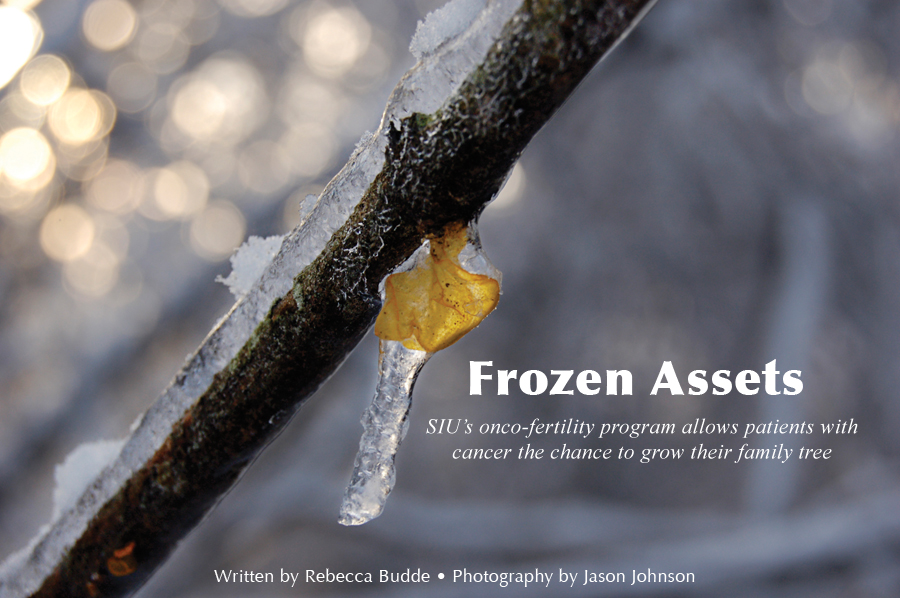Frozen Assets
Aspects Volume 38 No. 3

"I was 24 the first time I was diagnosed with testicular cancer," Eric Melito says. Four-and-a half years after surgeons removed his left testicle, Melito was diagnosed with a completely different type of cancer in his right testicle. The surgeries left him sterile. "Someday, when I fall in love with the right person, I do want to have children," Melito says. "I’m the last male in my family line."
Focus on the future
The devastation of a cancer diagnosis often leaves patients and their families intensely focused on fighting the cancer. The fear of dying overtakes the thoughts of the future, especially the hope of ever becoming a mother or father. But Ricardo Loret de Mola, MD, professor and chair of the Department of Obstetrics and Gynecology and director of the SIU Fertility & IVF Center, and Tobias Köhler, MD, associate professor of urology and director of SIU’s onco-fertility program, provide hope for those who want a family of their own in the future. "It’s our job to focus on the things patients can’t think about, like their fertility, because they have tunnel vision," Dr. Köhler says.
But cancer is a curiosity. It can dish out surprises that even oncologists don’t expect; subsequently, a non-toxic regimen may need to be switched to a more toxic treatment or the cancer may recur. In these cases, fertility may be permanently lost after treatments are  complete. And, in the case of men, even if the sperm count returns to normal, cancer and the treatment methods can result in poor sperm quality, according to Dr. Köhler.
complete. And, in the case of men, even if the sperm count returns to normal, cancer and the treatment methods can result in poor sperm quality, according to Dr. Köhler.
Physicians recommend that cancer survivors wait two years after chemotherapy before trying to start a family the old fashioned way. However, for a couple in their late twenties or early thirties, two years can be a long wait, and delaying pregnancy can lead to other fertility concerns associated with aging.
"I was so wrapped up and overwhelmed with data and emotions," says Matthew Bower, 37, regarding his mouth and lymph node cancer diagnosis in 2013. K. Thomas Robbins, MD, now retired professor and former chair of the otolaryngology division, told Matthew and his wife, Katrina, 34, that one side effect of the chemotherapy is degeneration of sperm cells. "We weren’t 100 percent sure we wanted kids at that point, but I didn’t want cancer to take that away from me too."
24-hour commitment
Dr. Köhler and Dr. Loret de Mola are so committed to helping patients preserve their fertility that they see the patient at no cost within 24 hours of a request. "We will drop everything to freeze the sperm or embryos for them," Dr. Köhler says. "There is no cancer so urgent that we can’t take the time to preserve a person’s fertility."
The process of banking sperm is relatively quick and simple for men. Once a sample is obtained, the sperm can be frozen in multiple vials. Since only one sperm is needed to fertilize an egg, "the sky’s the limit of how many kids you can have and how many times we try," Dr. Köhler says.
Though the process can be more time consuming and involved, women have options to ensure that they are passing on their DNA to the next generation. Hormones can stimulate a menstrual cycle so that physicians can retrieve eggs, fertilize them with the partner’s or donated sperm and then freeze the embryos. Though current technology in some centers allows eggs to be successfully frozen, SIU does not currently freeze unfertilized eggs. Embryos are heartier than eggs and are more successful at achieving viable pregnancies. In addition, some women may be candidates for surgery to move their ovaries out of the field of radiation.
Though all these measures are available and have shown success, the service is significantly underused across the country, according to Dr. Köhler. This may partially be due to the perception that successful pregnancy rates using banked sperm or embryos are low. However, with current technology, the success rate is near 70 percent. "It’s well worth it to have the chance of having your own biological children," Dr. Köhler says.
"Eighty percent of young people who are diagnosed with cancer end up doing well," says Dr. Köhler. Once patients begin to broaden their focus from beating cancer, continuing their family tree becomes important. "The solution is simple: address the concerns with us so that down the road, you can have a happy, healthy family of your own."
Both Melito and Bower took Dr. Köhler’s advice and had their sperm banked. Melito, now 33, has the opportunity to have his own biological children in the future. "I’m thankful that Dr. Köhler took time to talk to me about this so that I do have the option of having biological children."
Matthew just reached the two-year milestone since his last chemotherapy treatment, and he and Katrina are awaiting results of tests that will confirm if Matthew’s sperm is back to normal.
By taking action before cancer treatment begins, physicians can provide patients with the greatest prospect of having biological children. "Having the conversation about fertility is a positive distraction from the cancer itself. We’re saying, ‘When you live, we are going to have this to help you start a family,’" Dr. Köhler says.
 Dr. Tobias Köhler talks about onco-fertility: http://bit.ly/kohleroncofertilityvideo
Dr. Tobias Köhler talks about onco-fertility: http://bit.ly/kohleroncofertilityvideo
